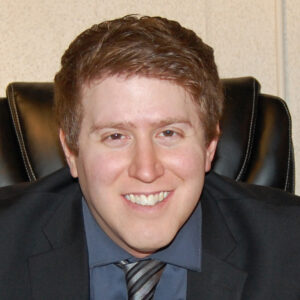
Former Deputy Chief Greg Rogers Receives Robert W. Gain Fire Prevention Leadership Award
Greg Rogers was honored with the International Code Council's 2023 Robert W. Gain Fire Prevention Leadership Award.
Greg Rogers, former Deputy Chief for the Spokane Valley Fire Department in Washington, has gone above and beyond in his quest for fire safety. His devotion to building safety and his commitment to improving the International Fire Code® (IFC) are just two of the reasons why he has been honored with the International Code Council’s 2023 Robert W. Gain Fire Prevention Leadership Award.
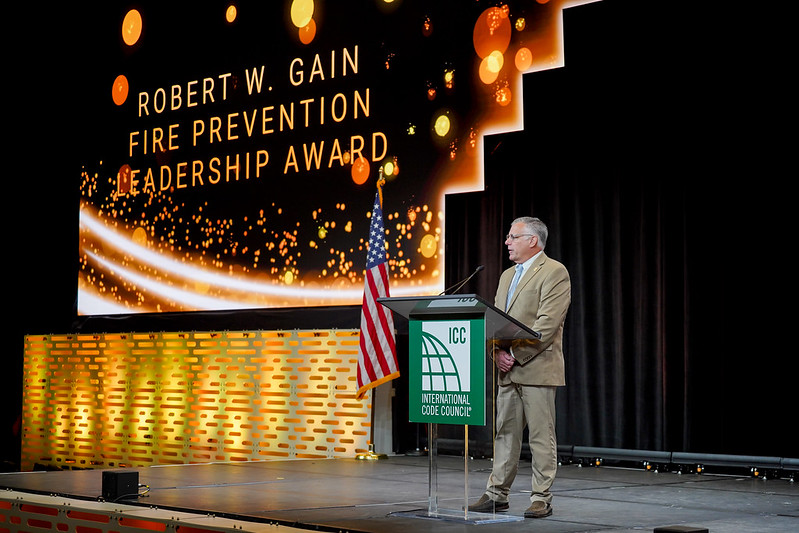
This award is presented to an individual who has demonstrated exceptional leadership and longstanding dedication in support of fire codes and fire prevention. Rogers’ many accomplishments certainly apply, but his most notable came in 2006 when he began to investigate the growing number of marina fires occurring in Seattle. No marina requirements were in the code at the time, so Rogers set out to make a change.
“We had developed a task group in Washington to look at the marina fire safety issue,” said Rogers. “And I wanted to take what we were doing to the national level through the International Fire Code.”
Before adding a new chapter to the IFC, Rogers had to justify its inclusion. He had to first identify the problem, which included the safety risks and the millions of dollars that were being lost as fires ravaged marinas across Seattle. However, that was only part of the challenge – to be added to the code, Rogers would need to show how the risk and damage of future fires could be minimized, if not prevented.
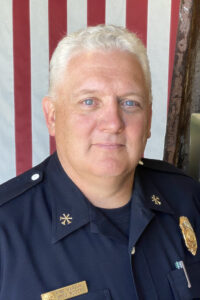
Advocating for Fire Safety Requirements Within the International Fire Code
Rogers, who serves as Chair of the International Association of Fire Chiefs (IAFC) Fire & Life Safety Section, succeeded in his mission. In the new chapter added to the IFC in 2009, he and his task group outlined the safety requirements for covered and uncovered marinas. Some of the additions included requirements for hose connections, equipment staging areas and addressing (which would guide the marking process). The chapter also explained how a covered, un-sprinklered marina would require drop-out panels that could drop out if something caught on fire, allowing smoke and heat to vent.
“I had to go through three different code hearing processes to get [the marina fire safety updates] adopted,” Rogers recalled. “I had to make changes based upon the debate and the information I heard during the hearing process.”
After his recommendations were adopted, some legacy code officials came to know Rogers as the “Marina Man,” a term they jokingly, and affectionately, used to describe him.
“To be able to sit in a hearing room and hear people talk about those issues, and not just from someone teaching from the book, it puts a different twist on it,” Rogers added. “That’s why the process, and to be able to do what I do, is so awesome.”
Committed to Fire Safety from Day One
Rogers’ career began at Oklahoma State University. He decided to enroll in the school’s Fire Protection and Safety Engineering Technology program after admiring the work of his uncle, who was a firefighter in Kansas City, MO. Many encouraged him to go into the private sector after graduation, including college friends and roommates who went to work for oil companies and other large corporations. Rogers knew he would be happiest and most satisfied with a career in public service, but he had no idea that this career choice would also become his passion.
His first job out of college was with North Metro Fire Rescue in Colorado, which opened the door to his first experience with the code hearing process. The Fire Marshals Association of Colorado approached him and asked him to participate as a Colorado delegate at the very first Code Council code hearings in Alexandria, VA in 1998.
The hearings were jam-packed with ideas – Rogers estimates that as many as 1,200 different code proposals were presented over five or six days. Each day started at 8:00 a.m., but with so many proposals to discuss, the hearings lasted well into the evening.
“I had to share a room with one of the other individuals from the association, and he asked me what I thought,” said Rogers. “I told him, ‘This is the coolest thing ever. I can’t believe I’ve had the opportunity to participate in it and be here.’”
Surprised, his roommate replied with a few words Rogers will never forget.
“Oh, you’ve gotten sucked into this just as bad as we have,” he said. “You’re a code geek like we are.”
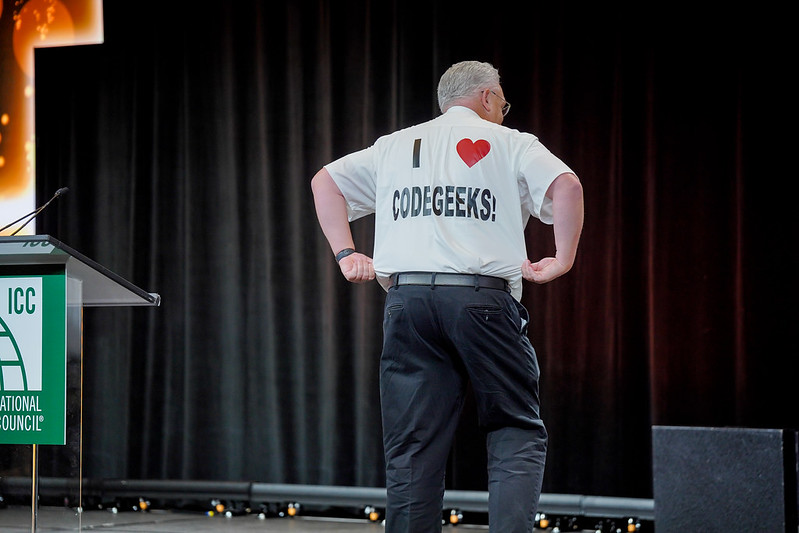
That was the first time Rogers heard the term “code geek,” but it wouldn’t be the last. He has maintained his excitement for the codes ever since and continues to learn and share his knowledge to this day.
“I always say that going to a code hearing is better than going to a code class because you get to hear the reason why people want it in the code and their true interpretation of it,” Rogers explained. “You [also] get to hear people argue against why it shouldn’t be in the code, so you understand the true intent of why something was [or wasn’t] put in the code.”
Rogers appreciates the opportunity to personally influence what goes into the code, which ultimately impacts the rest of the industry. By being involved with these hearings, Rogers has also been able to build his network of knowledgeable individuals that he can call upon whenever necessary. This is especially important in a field where no one is an expert.
“[My colleagues] always told me that if I ever hear someone say they are an expert in the code, you know they’re lying,” said Rogers. “You can be an expert in parts and pieces, but it’s virtually impossible to be an expert in all of it.”
A Career in Fire Safety Opens Doors You May Not Expect
He may not take credit for being an expert, but Rogers’ expertise – and ongoing contribution to the codes and to fire safety – should not be overlooked. He has served on several committees and working groups throughout his career, including the International Fire Code Development Committee (2014 – present), the International Fire Code Action Committee (2013 – 2019) and the Joint Fire Service Review Group ICC / IAFC (2004 – 2007).
Rogers also served on the Executive Fire Officer Program Redevelopment Workgroup (2019 – 2021) and was the Chair of the Correlating Committee for the Uniform Fire Code Association 20 years prior (1999 – 2001). While he may have retired as Deputy Chief, he has no interest in leaving the code world behind.
“As long as I have something to offer and can keep contributing at a certain level, I always want to continue to help,” said Rogers. “To me, it’s about continual improvement.”
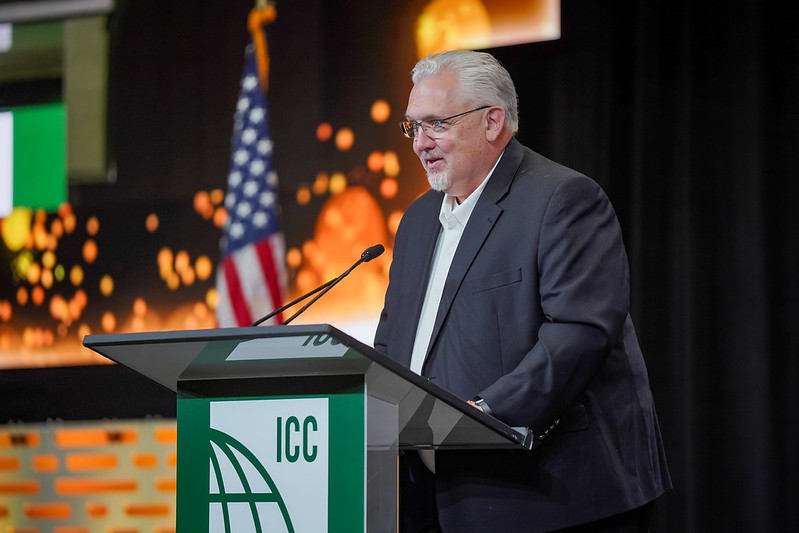
Rogers also wants to encourage more code geeks to get involved in the code development process. He estimates that there were 50 to 60 people involved when he started, but only half remain. He is concerned that if other code geeks don’t follow in his footsteps, it may be difficult for his legacy, and the legacies of those he admires, to be carried over to the next generation. Those who don’t participate are greatly missing out on the opportunity to shape the future of the codes from their perspective, which makes their job as code officials far more rewarding.
Rogers’ devotion to the codes, and his determination to share his knowledge with others, inspired him to take a job with Inspection Reports Online as Western Regional Rep. He said that this job and others like it provide new opportunities for code officials to explore as they grow in their respective careers.
“I don’t think people realize that there are so many opportunities afforded to you once you have that experience as a code official,” said Rogers. “Opportunities that are outside of the code official world. For example, there are large companies doing plan reviews for very small jurisdictions that don’t have enough work to hire a full-time plan reviewer, so they hire a third-party company.”
Some enterprises develop electronic plan review software with the help of people who understand the code and all of its intricacies, and that’s just the beginning.
“I worked with a plan reviewer [who is] now involved with energy projects with universities,” said Rogers. “He goes over to Dubai and works on projects for them and their government. It amazes me to watch people and see where they go and what they do. They were given that opportunity because they got into the industry.”
Guiding the Future of Fire Safety
Rogers sees the Code Council’s 2023 Robert W. Gain Fire Prevention Leadership Award as a powerful recognition of his work in fire safety and his dedication to shaping the codes for the better.
He was especially proud to be among the previous award recipients, including Ray Bizal (2006), Director of Regional Operations for the National Fire Protection Association. Rogers also noted the great work of Jackie Gibbs (2004), a retired Fire Chief who served the City of Marietta, GA Fire Department for more than 40 years, Robert Davidson (2006), a retired Fire Marshal of 35 years and now Partner in Code Concepts Group, LLC, and Jeff Shapiro (2019), President of the International Code Consultants.
“When I look at the names, it’s amazing to me how much [these individuals] helped me and how much I admired all the work they did throughout their careers,” Rogers boasted. “Getting that recognition says, ‘Hey, I’ve done it!’ But it also says I’m not finished. I know several people who have won these awards who are still involved in the process today.”
Rogers’ latest goal is to educate people about the dangers of electric vehicles, mobility devices (ex: electric scooters) and mobile devices (ex: smartphones, tablets, etc.). Each of these devices contains rechargeable lithium-ion batteries that are safe when used appropriately but could catch fire when used carelessly.
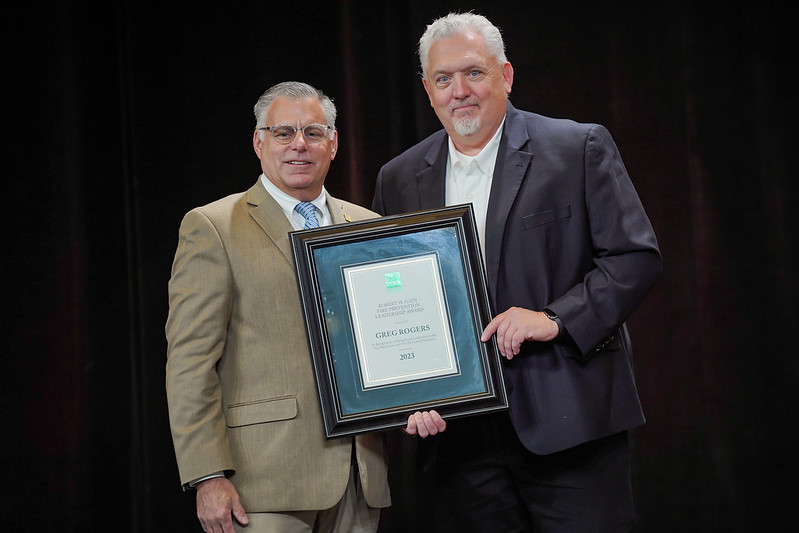
“The International Association of Fire Chiefs has established a work group and a website on these topics to develop resources across the country,” Rogers said of the effort to inform the public about fire safety when using their electronics and how to prevent fires while using oxygen. “We’re working with folks from the industry, the International Association of Firefighters, the American Burn Association, and fire departments from around the country. There’s a huge group that has come together to try to create these resources on both topics.”
Rogers is also working on educating people about the danger of smoking while on oxygen, which has recently become a significant factor in fire fatalities in the US. Rogers said that the goal is to adopt an engineered solution for this problem called a thermal fire break.
“We are trying to get it adopted in code and standards, as well as get Medicaid and Medicare to cover the cost,” Rogers concluded.
Learn more about the Code Council’s awards program and nominate a building safety professional for a 2023 award by visiting the Code Council’s awards page.
